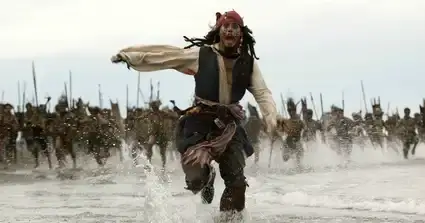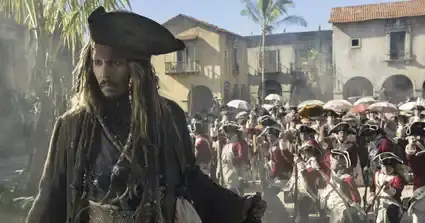Based on the famous Disney parks attraction, 'Pirates of the Caribbean' debuted in theaters with a bang, in a feature-length film directed by Gore Verbinski ('Rango') and with Johnny Depp at the peak of his acting, transforming Jack Sparrow into one of the most memorable anti-heroes in cinema - and receiving an Oscar nomination for the role. With frenetic sequences, just like a park ride, 'The Curse of the Black Pearl' is pure entertainment, rescuing a subgenre of fiction (pirate stories) that seemed forgotten.
Pirates of the Caribbean: Dead Man's Chest is the second film in the franchise starring Jack Sparrow. After a first film that establishes the characters and the pirate world, this second chapter finally introduces the saga's main villain: Davy Jones, a tentacle-faced creature brilliantly portrayed through motion capture by Bill Nighy. The story unfolds as Jack Sparrow (Johnny Depp) tries to retrieve Jones' heart to avoid enslaving his soul in service to him—only to find his enemies also seek the heart for their own agendas. Director Gore Verbinski brings even more energy to the action scenes and skillfully keeps the audience engaged as the various characters’ paths intertwine and diverge at breakneck speed. There’s also a spotlight on the ever-complicated romance between Elizabeth Swann (Keira Knightley) and Will Turner (Orlando Bloom), with sparks constantly flying.
Pirates of the Caribbean: At World's End is the near-perfect conclusion to the initial trilogy directed by Gore Verbinski, solidifying it as a true Disney blockbuster saga that knows how to play with Hollywood's cinematic symbols and meanings, and more importantly, respects moments of silence, character transformations, and is unafraid to bring closure. In this chapter, Will Turner (Orlando Bloom) and Elizabeth Swann (Keira Knightley) head East in search of a way to rescue Captain Jack Sparrow (Johnny Depp) from Davy Jones' (Bill Nighy) purgatory, while the East India Trading Company uses the Flying Dutchman to dominate the seas and end piracy. The film works not only because of its energetic and urgent tone, but also for surprising audiences with unexpected alliances, like the partnership with Captain Hector Barbossa (Geoffrey Rush, always brilliant) and the Black Pearl pirates. With Hans Zimmer's iconic score, the film amplifies the terror surrounding Jones, who is not just a villain seeking revenge—there is something dramatic behind his now more fragile figure. It’s a film that thrills, moves, and gets you on your feet, especially during the final showdown filled with excellent special effects.
You could say that Pirates of the Caribbean: On Stranger Tides is the movie almost no one asked for. After a trilogy of blockbusters far above average, Disney insisted on a fourth film in the saga. This time, Gore Verbinski steps aside to make way for director Rob Marshall, known for Into the Woods and Chicago — a filmmaker more accustomed to musicals than to movies like this. The cast sees the departure of Orlando Bloom, Keira Knightley, and Bill Nighy, while Penélope Cruz and Ian McShane join the story, accompanying Jack Sparrow (Johnny Depp) and Barbossa (Geoffrey Rush) on a quest to find the Fountain of Youth, only to discover that Blackbeard (McShane) and his daughter (Cruz) are after it too. The film is far less exciting and entertaining than its predecessors, missing the familiar magic, though it still carries a spark. There’s some fun to be had in this world, which begins to carry a sense of urgency toward its end. The standout is Rush, portraying a less cynical and more emotional Barbossa.
Pirates of the Caribbean: Dead Men Tell No Tales is the fifth and most exhausting (and exhausted) film in the franchise. Directed by Joachim Rønning and Espen Sandberg (both of Kon-Tiki), the movie tries to bring back old characters, like Orlando Bloom’s Will Turner, while introducing new actors, such as Javier Bardem as Captain Salazar and Kaya Scodelario as Carina Smyth. The fact is, you can tell the veteran actors are tired: they seem less natural and less fun than in previous films. It's worth noting that during the shooting of this fifth chapter, Depp was experiencing the downfall of his career amidst his divorce from fellow actress Amber Heard. As a result, it’s a rather uneven conclusion, wrapping up some storylines while leaving others open for a sixth film that never materialized. At least there's still some fun to be had with the always inspired Geoffrey Rush and Bardem's seductive villain. A bittersweet end, but with a hint of what Pirates of the Caribbean once was.




